| Srl | Item |
| 1 |
ID:
097411
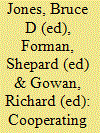

|
|
|
|
|
| Publication |
Cambridge, Cambridge University Press, 2010.
|
| Description |
xv, 332p.
|
| Standard Number |
9780521889476, hbk
|
|
|
|
|
|
|
|
|
|
|
|
Copies: C:1/I:0,R:0,Q:0
Circulation
| Accession# | Call# | Current Location | Status | Policy | Location |
| 055047 | 341.2/JON 055047 | Main | On Shelf | General | |
|
|
|
|
| 2 |
ID:
151496
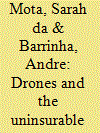

|
|
|
|
|
| Summary/Abstract |
This paper engages with the security dynamics underlying the use of drones and their impact on security subjects – individuals and groups that are the ultimate recipients of specific security policies, regardless of whether these have beneficial effects on them. Using Mark Duffield’s distinction between the insured Global North and the non-insured Global South, this paper discusses how drones generate a radical dissociation between the intervener and the intervened that ultimately produces new security environments at the margins of the international system. These new security environments are defined by the articulation between space, technologies and bodies: bodies of invisible subjects; bodies that are uninsurable.
|
|
|
|
|
|
|
|
|
|
|
|
|
|
|
|
| 3 |
ID:
148296
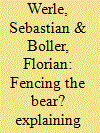

|
|
|
|
|
| Summary/Abstract |
Despite the burgeoning literature on Russia’s renewed power politics, little attention has been paid to the fact that US reactions towards Russia’s military interventions were all but coherent. The USA has chosen weak measures in Georgia in 2008 (shaming) compared to its assertive response in Ukraine in 2014 (sanctions, hard deterrence). This article assesses the explanatory power of neorealist, liberal and constructivist theories for the variation in US reactions towards Russian interventions in Georgia and Ukraine. Our argument is that the constructivist perspective explains the cases best as it highlights the power and communality of normative assessments. The Ukraine crisis was perceived by the USA as a violation of core international norms, especially the non-use of force and the principle of territorial integrity. Relevant international norm carriers shared this assessment of the conflict. In contrast, the perception of the Georgian war centred on the issue of democracy promotion. While democracy is an important aim of US foreign policy, it does not summon the same normative importance as general principles of international law. Furthermore, the perception of the Georgian war remained contested among Western allies, which decreased the communality of the normative assessment.
|
|
|
|
|
|
|
|
|
|
|
|
|
|
|
|
| 4 |
ID:
103199
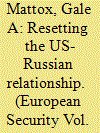

|
|
|
|
|
| Publication |
2011.
|
| Summary/Abstract |
The determination of the USA to 'reset its relationship' with Russia has been a major security policy objective for the current US Administration. An admirable objective, it has proved more illusive than anticipated. But a focus on 'cooperative engagement'1 that selectively addresses areas of common interests such as Iranian nuclear developments, a range of issues dealing with nuclear arms control, missile defense, and NATO-Russian relations (among others) could prove fruitful for both lessening tensions and establishing common agendas to resolve contentious issues. Important to that process will be enhancing institutions in order to assure longer-term productive relations that engage and vest both the USA and Russia. This more realistic approach of 'cooperative engagement' within existing, but strengthened organizations would both 'reset' the relationship and encourage relations that reach beyond cold war military thinking to sustained future cooperation.
|
|
|
|
|
|
|
|
|
|
|
|
|
|
|
|
| 5 |
ID:
137938
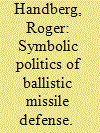

|
|
|
|
|
| Summary/Abstract |
Ballistic missile defense (BMD) politics present an interesting evolution in how the USA, especially Congress, has come to think about BMD both as operational reality and as a symbolic policy. The argument here is that BMD’s operational reality is increasingly overshadowed by its symbolic aspects. Such a status arose from rapidly changing international and domestic politics. The end result is a situation in which BMD policy in a sense floats above the question of its actual combat effectiveness. Its primary mission in part is sustaining US capacity to remain a global power and support its allies.
|
|
|
|
|
|
|
|
|
|
|
|
|
|
|
|
| 6 |
ID:
153841
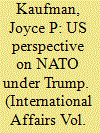

|
|
|
|
|
| Summary/Abstract |
As a new and unpredictable administration takes power in Washington, the relationship that the United States will have with its European allies remains unclear. There is understandably concern on both sides of the Atlantic about what this change will mean for the US relationship with NATO and the security guarantees that have been in place for almost 70 years. These concerns are not without foundation: just days before his inauguration, President-elect Trump once again described NATO as ‘obsolete’. Contradictory statements made by Trump and his candidates for Secretary of Defense and State raise further questions about the direction of US security policy, as well as the country's priorities. The Harmel Report was precipitated in part by the approaching 20th anniversary of the alliance in 1969 which caused NATO to rethink and redefine itself in light of changing realities. The incoming Trump administration is raising questions that are again exposing divisions among members of the Alliance which could prompt re-evaluation that could strengthen the institution by reaffirming its relevance in light of a resurgent Russia. Or the result could be to further the pattern whereby the United States pursues policies deemed to be in its own national interest at the expense of Europe, while simultaneously, the European countries develop their own policies, both individually and collectively, that minimize or exclude the United States. This article takes a historical perspective to explore the evolution of the trans-Atlantic relationship to the present and to speculate on what the past might tell us about the future.
|
|
|
|
|
|
|
|
|
|
|
|
|
|
|
|